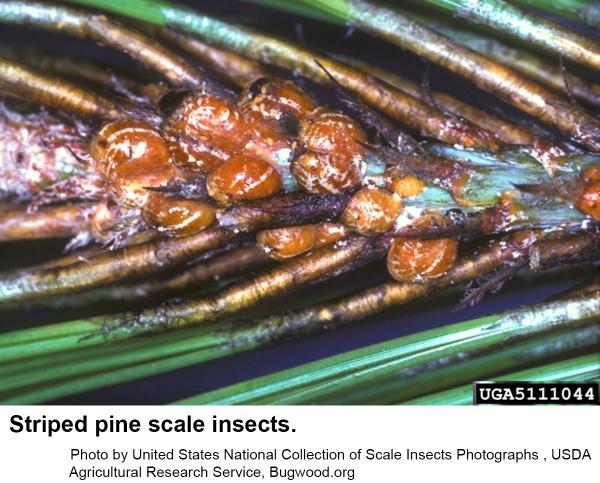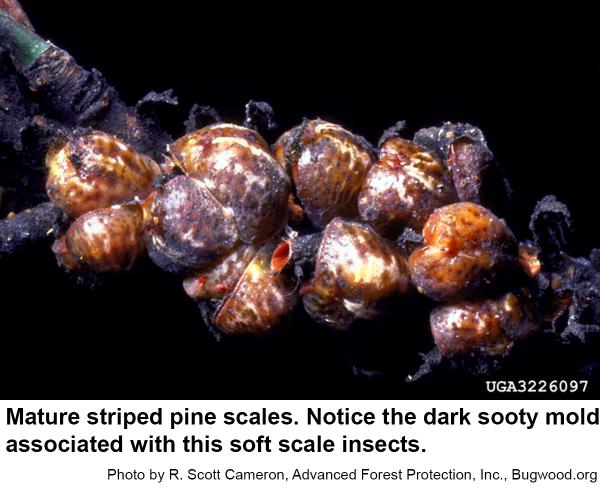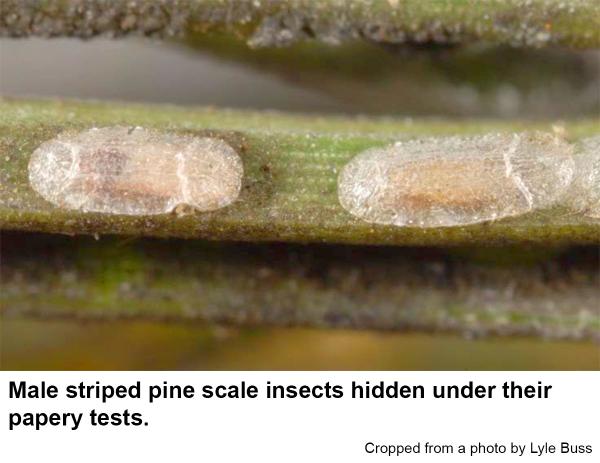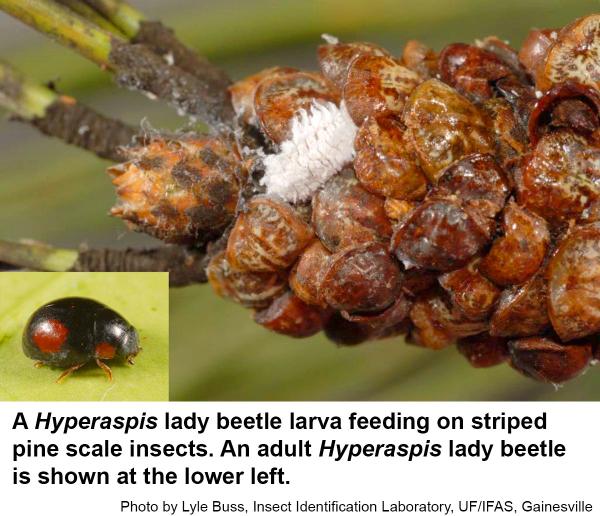Description and Biology
The striped pine scale insect, Toumeyella pini, is a relatively large soft scale pest that feeds on the outer tips or newer growth of pines. Females are rarely found on larger limbs. Striped pine scales are generally orange to brown with dark brown to black marking. They often have a whitish stripe or stripes down the back. Female scales remain on the twigs whereas males migrate to the needles to feed and develop. Males secrete a papery covering as they mature. In late summer, males emerge as tiny, winged insects that mate with the females. Adult males have no mouthparts so they die soon after mating. Striped pine scales spend the winter as fertilized, flat females attached to the twigs of the current season’s growth. Some mature females may also overwinter. Females begin to develop and lay eggs in May and early June. Mature females grow to about 1/4 inch in diameter and are almost hemispherical. Eggs hatch under the body of the mother, the lower surface of which has shriveled upward to form a shelter over the eggs. Crawlers begin to emerge by late May and early June. A single female can lay hundreds of eggs that hatch over a period of several weeks. There is usually one generation per year.
Host Plants
Scots pine, lodgepole pine, slash pine, pinyon pine, and Austrian pine are particularly susceptible to striped pine scales. Infested trees often turn dark with sooty molds and decline rapidly in vigor.
Residential Recommendations
On large trees, parasites and predators usually keep striped pine scale populations so low that the scales are not a nuisance. These include lacewing larvae, lady beetles, parsitic wasps, birds, and even a caterpillar, Laetilia coccidivora. Sometimes insecticides applied for another pest kill parasites and predators of the striped pine scale but the scales survive and reproduce unhindered by natural controls. Sevin gives good control when applied to the crawler stage. Other insecticides labeled for landscape use should also give more than adequate control when appliied to very young scales. Use a sprayable formulation and treat the plant thoroughly after the crawlers have emerged. The crawler stages usually occur in late May and early June. To help time the treatment, it would be a good idea to seal a small amount of infested plant material into a clear plastic bag sometime in early May. The bag should be place outdoors in the shade and examined every few days. When the tiny crawlers are noticed on the mother scales, on the bark, and crawling about inside the bag, that is a very good time to apply an insecticide.
References
- Scale Insects Affecting Conifers - 5.514. Cranshaw, W. S. 2013. Colorado State University Extension Fact Sheet.
- Sooty Molds. Frank, S. et al. 2002. Entomology Insect Notes, NC State Extension Publications.
- Striped Pine Scale. Eaton, E. R. 2014. Bug Eric, All about insects, spiders, and other arthropods, focusing on North America north of Mexico.
- Striped Pine Scale. Rajotte, E. 2017 (update). PennState Extension.
- NC State Extension Plant Pathology Publications
- NC State Horticultural Science Publications
- North Carolina Agricultural Chemicals Manual
For assistance with a specific problem, contact your local Cooperative Extension center.
This factsheet has not been peer reviewed.
Publication date: April 21, 2016
Reviewed/Revised: Oct. 15, 2019
Recommendations for the use of agricultural chemicals are included in this publication as a convenience to the reader. The use of brand names and any mention or listing of commercial products or services in this publication does not imply endorsement by NC State University or N.C. A&T State University nor discrimination against similar products or services not mentioned. Individuals who use agricultural chemicals are responsible for ensuring that the intended use complies with current regulations and conforms to the product label. Be sure to obtain current information about usage regulations and examine a current product label before applying any chemical. For assistance, contact your local N.C. Cooperative Extension county center.
N.C. Cooperative Extension prohibits discrimination and harassment regardless of age, color, disability, family and marital status, gender identity, national origin, political beliefs, race, religion, sex (including pregnancy), sexual orientation and veteran status.




